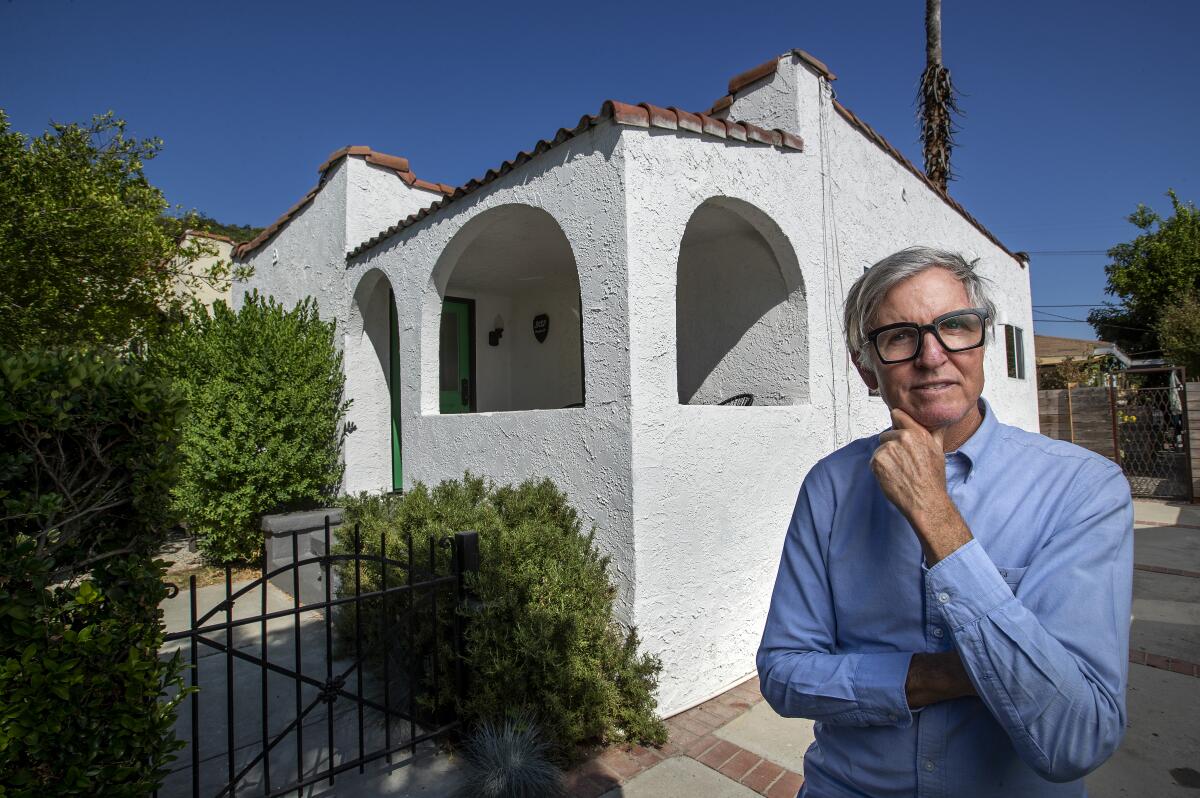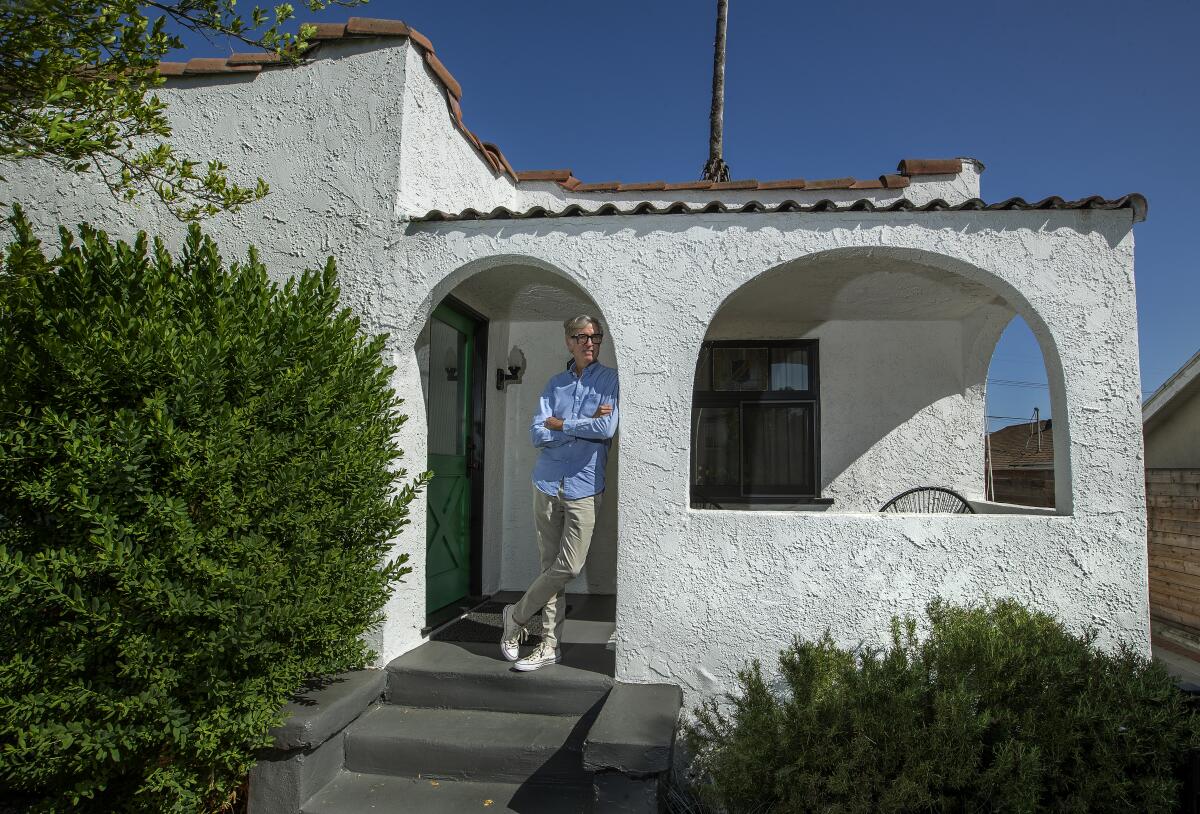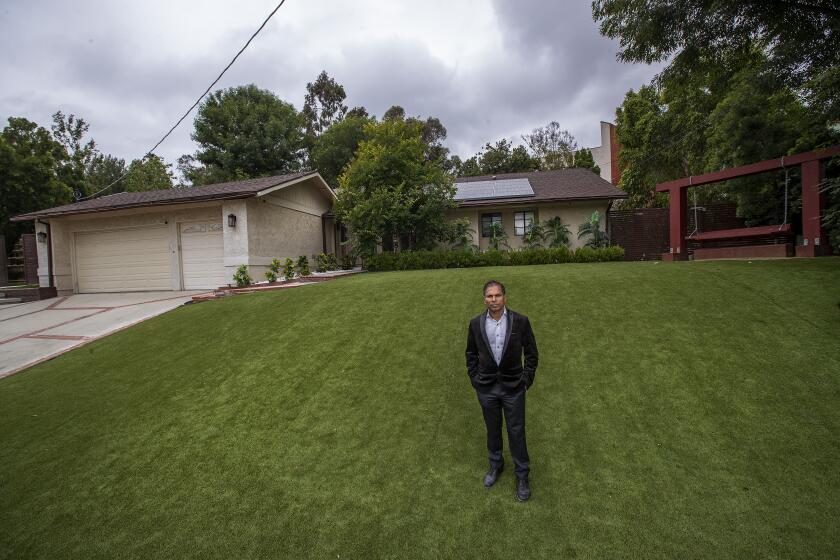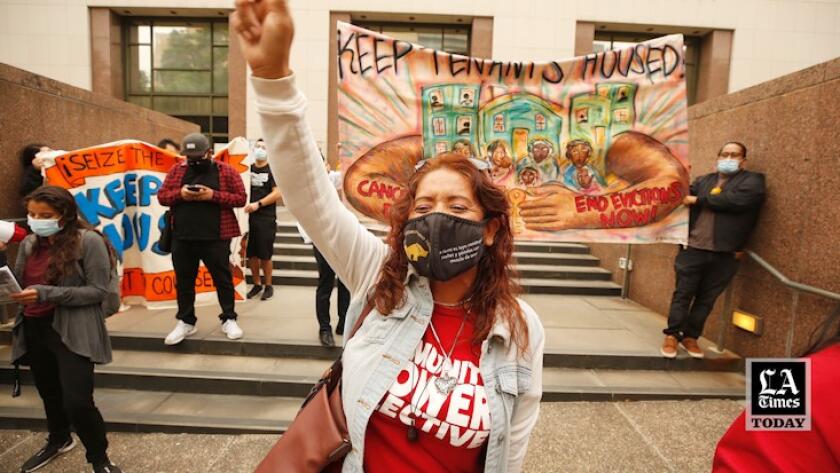L.A. tenants welcomed the rent freeze, but landlords are tired of restrictions

- Share via
David and Lisa Felker put their life savings into an eight-unit building in Los Angeles 15 years ago. The couple drove there on weekends and evenings to garden, make repairs, replace a broken garbage disposal or an air conditioner, and check on their tenants.
For the most part, they liked their tenants, who kept up with their rent as best they could. The Felkers planned to live off the income from the building when they retired two years ago — David from his job as a computer technician and Lisa as a pattern maker in the garment industry.
But L.A. implemented an emergency rent freeze on rent-controlled apartments at the start of the pandemic in 2020, as costs for insurance, earthquake retrofitting, water, inspections and trash collection rose. Soon, the Felkers said, they were hardly making a profit.
L.A. is the only major city that still has a freeze — lasting until Feb. 1. — on rent-stabilized units, which make up almost three-quarters of its apartments.
For many renters, the freeze has been a lifeline, allowing them to stay housed and keep up with vital expenses as inflation soared and many lost work hours and jobs.
But landlords like the Felkers say they were forgotten in the debate — forced to dip into savings and let tenants fall tens of thousands of dollars behind in rent, even selling nest eggs that were supposed to fund them through retirement.
In the summer of 2022, the Felkers sold their building to a large private firm.
With the profit, they invested in out-of-state properties, where David said they no longer endure the headaches of L.A.’s housing market.
Despite praise from tenant unions, some policy experts say that rent control reduces affordable housing by discouraging housing development and driving providers out of the business.
It’s the third time in recent years that a statewide initiative to repeal rent control restrictions will be on the California ballot.
“We have an affordability crisis and a homelessness crisis that absolutely demands urgent action, but a rent freeze is not the best solution,” said Michael Lens, associate professor of urban planning and public policy at UCLA.
Lens recognizes that the pandemic sent policymakers “reaching for the emergency button,” but the city should look at policies such as expanding housing subsidies rather than extending the rent freeze.
“In a city like L.A., that needs investment in housing, the last thing you want to do is drive away the people who are going to do the investment in housing,” said Jim Lapides, vice president of advocacy and strategic communications for the National Multifamily Housing Council. “And that’s what’s taking place right now.”
Evidence indicates that rent control increases the cost of non-rent-stabilized units, Lapides said. For example, in San Francisco, one study found that landlords reacted to rent control by reducing supply by 15%. This led to a 5.1% citywide rent increase.
But with California’s ongoing affordability crisis, tenant advocates say the rent freeze saved tenants who are still recovering from the economic consequences of the pandemic, including job losses, sick leaves and deaths of breadwinners in the family.
“It has taken this long to get people back on their feet, and some people never get back on their feet,” said Ryan Bell, Southern California regional coordinator for Tenants Together. “There’s a long tail to these types of crises.”
Homelessness increased by 10% in the city of Los Angeles last year. Shanti Singh, the communications and legislative director of Tenants Together, cautions city officials against lifting the rent freeze and potentially sending more renters into homelessness.
“Rent increases that were allowable with inflation were still really hurting people,” Singh said.
Landlords were allowed to apply for a rent increase if their income did not cover the property’s expenses. But Daniel Yukelson of the Apartment Assn. of Greater Los Angeles said in an email that the application requires “a mountain of financial information” and a number of bureaucratic hurdles.
Tough decisions
Small and medium-size “mom-and-pop” landlords say that the onslaught of renter protections in L.A. combined with soaring costs infringe on their ability to operate.
Thomas Daniels bought his first L.A. rental property in 2000.
Up until 2020, he hosted twice-yearly barbecues at his five buildings so that his tenants could get to know one another. Sometimes, renters met their next-door neighbors for the first time as they made their way down to the gatherings.
Aside from interacting with tenants, Daniels enjoyed taking buildings that were “not in great shape and turning them around, making it an attractive, nice place to live.”
Since February, Daniels has sold all five of his buildings.
With high inflation and soaring costs such as earthquake insurance, Daniels found he had to forgo roof, plumbing and electrical repairs. Eventually, he could not afford to stay in the market.
“The rent freeze was effective at keeping people in their homes and probably necessary to prevent homelessness,” Daniels said. “I think the problem is that property owners were ignored. [A lot] of rent-stabilized units are owned by mom-and-pop and mid-tier owners like myself, and we’re not making a lot of money.”
Each of his buildings has been taken over by a “wealthy corporation” or a “wealthy individual.”
“Right now, it’s the big fish eating the little fish,” Daniels said.
L.A. developer Akhilesh Jha is pushing the envelope in proposing to tear down single-family homes and build apartments using new provisions in state law.
Steven Jones has held out, but not without tweaking how he operates. With losses from the rent freeze and down an additional $24,000 from one tenant behind in his rent, Jones has to pick and choose what updates he makes to his buildings.

He is also more stringent about whom he rents to, and only considers people with superb credit scores. In the past, he was more lenient. He has taken chances on people when his gut told him to, and they managed to keep up with their deals.
Jones doubts he would do that again, unless they put down a large deposit.
“The tenants that it seems to me are the most vulnerable are the ones with the lousy credit,” Jones said. “I can sympathize with that. But one of the side effects to all of this regulation is that any property owner is going to take a very hard look at the applications that come in, especially the credit history.”
Striking a balance
Nike Irvin is a self-proclaimed “very pro-tenant landlord.” The native Angeleno grew up in West Adams, and she and her mother acquired a seven-unit building there in the 1990s. Now, she owns buildings in Silver Lake and Los Feliz, and her mother, 91, owns a building in Jefferson Park. Both live in buildings they own.
“We are African American, we understand the economic challenges in our community and want to be good, fair property owners, which I think we are,” Irvin said.
But she is struggling. She has had to skip on some improvements and dig into her own pockets for others. It cost her $30,000 to eliminate mold. Her mother’s income from her unit funds her elderly care, but she can barely cover it with meager profits.
For work, Irvin runs a leadership development program for social entrepreneurs that facilitates civil discourse across political divides. She laments the growing divide between landlords and tenants.
“I believe I’m a better person because I’m a property owner,” Irvin said. “I live in my building and I see how hard my tenants work. I see how well they take care of the building. And it just gives me a greater insight and understanding and respect for humans. It makes me want to make sure they have a good place to come home to. … It’s a service to provide housing for people.”
Like others, she worries about mom-and-pop landlords leaving L.A. as larger landlords come in, many of whom live outside the state or far from the buildings they own.
Irvin still plans to remain in the market, and pass her property down to her nieces and nephews.
Singh, of Tenants Together, said that each time tenant advocates propose new protection, landlords sound the same alarm about the demise of mom-and-pops. She questions how widespread this problem actually is.
The city of Los Angeles defines small landlords as owners with four or fewer units. Landlord advocates tend to conceptualize mom-and-pops and noncorporate landlords.
Regardless of a landlord’s size, Bell, of Tenants Together, said the city should address corporate takeover as a separate legislative issue.
“These are folks who have multiple homes to their names, and the tenants are clinging tenuously to their only home,” he said. “So it just isn’t the same level of need.”
When landlords sell a property, they make millions of dollars, Bell said.
“They’re gonna be OK,” he continued. “If the city wants to preserve those mom-and-pop landlords, they need to take on that burden and not put it on the backs of working-class residents.”
The Apartment Assn. of Greater Los Angeles sued the city in July over the rent freeze, citing financial strain on housing providers.
Landlords in the city have received more than $1.6 billion in rental assistance, and an additional $20 million is budgeted through United to House LA funding, said Sharon Sandow, a spokesperson for the Los Angeles Housing Department.
“We understand that landlords have been impacted by the protections adopted to keep renters safe during the pandemic,” she said in an email. “LAHD is making every effort to help out landlords — while also focusing on keeping tenants housed.”
- Share via
Watch L.A. Times Today at 7 p.m. on Spectrum News 1 on Channel 1 or live stream on the Spectrum News App. Palos Verdes Peninsula and Orange County viewers can watch on Cox Systems on channel 99.
More to Read
Sign up for Essential California
The most important California stories and recommendations in your inbox every morning.
You may occasionally receive promotional content from the Los Angeles Times.










